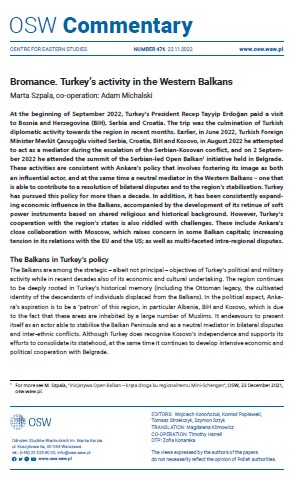Bromance. Turkey’s activity in the Western Balkans
Bromance. Turkey’s activity in the Western Balkans
Author(s): Marta Szpala, Adam Michalski
Subject(s): Business Economy / Management, Economic policy, Government/Political systems, International relations/trade, Political behavior, Economic development
Published by: OSW Ośrodek Studiów Wschodnich im. Marka Karpia
Keywords: Turkey; Western Balkans; diplomatic activity; Economic impact of Turkish business; Trade partners;
Summary/Abstract: At the beginning of September 2022, Turkey’s President Recep Tayyip Erdoğan paid a visit to Bosnia and Herzegovina (BiH), Serbia and Croatia. The trip was the culmination of Turkish diplomatic activity towards the region in recent months. Earlier, in June 2022, Turkish Foreign Minister Mevlüt Çavuşoğlu visited Serbia, Croatia, BiH and Kosovo, in August 2022 he attempted to act as a mediator during the escalation of the Serbian-Kosovan conflict, and on 2 September2022 he attended the summit of the Serbian-led Open Balkan initiative held in Belgrade. These activities are consistent with Ankara’s policy that involves fostering its image as both an influential actor, and at the same time a neutral mediator in the Western Balkans – one that is able to contribute to a resolution of bilateral disputes and to the region’s stabilization. Turkey has pursued this policy for more than a decade. In addition, it has been consistently expanding economic influence in the Balkans, accompanied by the development of its retinue of soft power instruments based on shared religious and historical background. However, Turkey’s cooperation with the region’s states is also riddled with challenges. These include Ankara’s close collaboration with Moscow, which raises concern in some Balkan capitals; increasing tension in its relations with the EU and the US; as well as multi-faceted intra-regional disputes.
Series: OSW Commentary
- Page Count: 8
- Publication Year: 2022
- Language: English
- Content File-PDF

